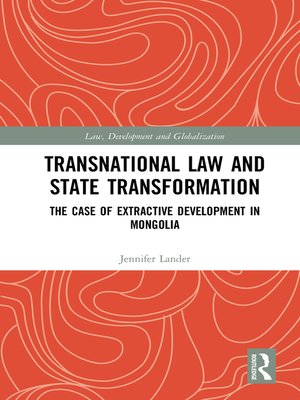Transnational Law and State Transformation
ebook ∣ The Case of Extractive Development in Mongolia · Law, Development and Globalization
By Jennifer Lander

Sign up to save your library
With an OverDrive account, you can save your favorite libraries for at-a-glance information about availability. Find out more about OverDrive accounts.
Find this title in Libby, the library reading app by OverDrive.



Search for a digital library with this title
Title found at these libraries:
| Library Name | Distance |
|---|---|
| Loading... |
This book contributes new theoretical insight and in-depth empirical analysis about the relationship between transnational legality, state change and the globalisation of markets.
The role of transnational economic law in influencing and reorganising national systems of governance evidences the constitutional dimensions of global capitalism: the power to institute new rules and limits for national states. This form of new constitutionalism does not undermine the state but transforms it by eroding national capacities and implanting global alternatives. While leading scholars in the field have emphasised the much-needed value of case studies, there are no studies available which consider the cumulative impact of multiple axes of transnational legal ordering on the national state or its constitution. This monograph addresses this empirical gap, whilst expanding the theoretical scope of the field. Mongolia's recent transformation as a mineral-exporting country provides a rare opportunity to witness economic and legal globalisation in process. Based on careful empirical analysis of national law and policy-making, the book traces the way distinctive processes of transnational legal ordering have reorganised and reframed the governance of Mongolia's mining sector, specifically by redistributing state power in relation to the market, sub-national administrations and civil society. The book investigates the role of international financial institutions, multinational corporations and non-governmental organisations in normative transmission, as well as the critical role of national actors in embedding transnational investment norms within the domestic legal and policy environment. As the book demonstrates, however, the constitutional ramifications of transnational legal ordering extend beyond the mining regime itself into more fundamental questions of the trajectory of state transformation, institutionally and ideologically.
The book will be of interest to scholars of international law, global governance and the political economy of development.







